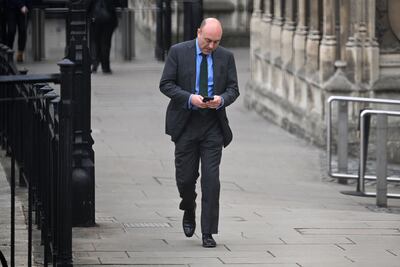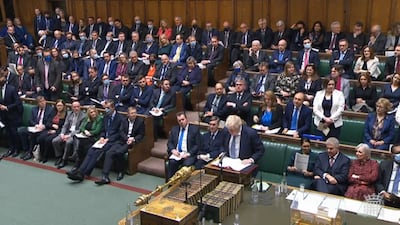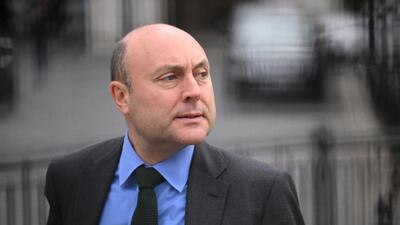It is not the first time Downing Street’s new policy chief Andrew Griffith has boarded a vessel veering towards the rocks. In 2018 he won The Sunday Times's Non-Executive Director of the Year by stabilising the catering company Just Eat when it had lost its chief executive and another senior director.
The award was for his role in “steadying the company through this period of turbulence” while interim chairman.
The MP, named on Thursday as Boris Johnson's new Policy Unit director, will draw deeply on that experience and three decades years at Sky television to steer the Downing Street operation away from a less perilous course.
With just two years in politics, albeit one filled with high-level appointments, it will be a challenge — possibly the biggest he’s faced and potentially the most short-lived.
The odds for the British prime minister’s time in office extending beyond this year are shortening as political turmoil engulfs Number Ten with five top-level resignations over 24 hours, including Munira Mirza whom Mr Griffith replaced.
If Mr Johnson needs a stalwart, trusted lieutenant who will fight hard he has chosen well in Mr Griffith.
The 50-year-old former television executive can bring his long experience of controlling business turbulence to the rocky Downing Street operation.
Mr Griffith understands graft. Unlike some Conservatives, he did not come from privileged background, attending state school in south London before studying law at Nottingham University then qualifying as a chartered accountant in 1996.

After stints at investment bank Rothschild & Co and accountants PwC, he joined Sky television as a financial analyst, working his way up to become chief financial officer in 2008. He was 37, becoming the youngest financial director in the FSTE 100. He later became Sky’s chief operating officer.
Clearly he is financially astute. His Westminster home, valued at just under £10 million, became the headquarters for Mr Johnson’s 2019 leadership campaign. He was also paid £11.7m in the two years before the US giant Comcast took over Sky in 2018.
It is understood the relationship with Mr Johnson grew while Mr Griffith was chairman of the Centre for Policy Studies think tank with its strong Conservative Party links and belief in free markets, low tax and a small state.
He went straight into the heart of Mr Johnson’s inner circle, entrusted as his chief business adviser at Downing Street. A few months later, in the 2019 general election, he was given the safe seat of Arundel and South Downs and within a year was appointed as Britain’s 'Net Zero Business Champion', a key role in the run-up to the Cop26 climate summit in Glasgow last year.
Success there saw him step further into the inner-circle in September last year, becoming Parliamentary Private Secretary to the Prime Minister, working with MPs while assisting the leader. At times during Prime Minister’s Questions Mr Griffith could be seen leaning forward over the front bench with a note or a whispered comment.
He also appears reconciled to Mr Johnson’s testimony that he did not believe the Downing Street lockdown social gatherings were parties.
“Having lost my own father to Covid during the most restricted phase of the 2020 lockdown, I wholly understand the pain, hurt and frustration caused by allegations of drinks parties both in 10 Downing Street and by the Leader of the Opposition,” he wrote in his local newspaper. “I won’t rush to judgment until the independent report lays out the facts which I look forward to then scrutinising closely.”
On his appointment on Thursday, Mr Griffith was quick to remind people on Twitter that it was Mr Johnson who had won the 80-seat “mandate” to govern. He added that “the Number Ten Policy Unit has a vital role to play delivering policies that reflect the priorities of people across the UK”.
He also pushed out a message that might help to steady waverers, referring to working with “Parliamentary colleagues” — backbench MPs — to deliver an agenda focused on “on strong Conservative principles”, not the perceived left-wing policies of Ms Mirza that displeased some Tories.
Clearly Mr Griffith brings considerable business experience from outside the political world that the next prime minister, potentially the Chancellor Rishi Sunak, may well recognise.
If he does find himself as an unused backbench MP he can return to the unfinished policy he pursued on first entering parliament, setting up the “Dark Skies” All Party Parliamentary Group.
As a south Londoner, Mr Griffith’s first experience of a night sky untarnished by light pollution came during a trip to Morocco experiencing the beauty of a desert night sky.

His new group wants the UK to adopt lighting that cuts down on light pollution and planning policies to protect International Dark Sky Places.
“I founded the APPG for Dark Skies shortly after being elected to Parliament so that future generations may still be able to see the stars and the Milky Way — something that is already impossible in many parts of the UK,” Mr Griffith said.








